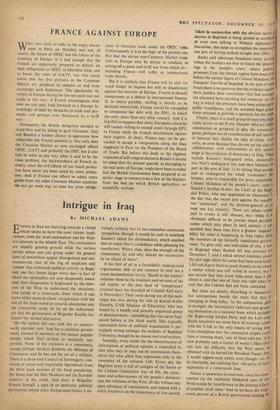FRANCE AGAINST EUROPE
WHAT was really at stake in the angry discus- sions in Paris on Monday was not, of course, the future of OEEC but the future of the economy of Europe. It is bad enough that the French are apparently prepared to default on their obligations to OEEC to liberalise trade and to break the rules of GATT, too—but much worse that her five partners in the Common Market are prepared to connive .at and even encourage such behaviour. The spectacular re- covery in Europe during the last ten years was not made in this way; if French intransigence wins now we can only look forward to a Europe in- creasingly divided by obstacles to trade and pay- ments, and perhaps even threatened by a tariff war.
Fortunately the British delegation decided to stand firm and by doing so gave Germany, Italy and Benelux a further chance to appreciate how vulnerable the French position is. Not only does the Common Market as now envisaged offend OEEC, GATT and probably the IMF, but it also fails to solve in any way what is said to be the main problem, the backwardness of French in- dustry, since the evil effects of too much protec- tion have never yet been cured by more protec- tion. And if France can afford to admit more goods from the other Common Market countries she can go some way to meet her prior obliga- lions to liberalise trade under the OEEC rules. Unfortunately it is in the logic of the present con- flict that the eleven non-Common. Market coun- tries in Europe may be driven to retaliate, so setting off a quota and tariff war from which all— including France—will suffer as international trade shrinks.
But it is unlikely that France will be able for much longer to impose her will so disastrously against the interests of Europe. France is already conspicuous as a debtor in international finance. If, as seems possible, sterling is shortly to be declared convertible, France would be compelled to compound her debt with the EPU, to which she owes more than any other country. And it is fanciful to suppose that many European countries will remain willing to extend credit through EPU to France while the French discriminate against their exports. In short, France may yet be per- suaded to accept a compromise along the lines suggested in Paris by the President of the Board of Trade. But before this leads to the slightest suspicion of self-congratulation in Britain it should be noted that the present quarrel, so damaging to the real unity of Europe, might have been avoided had the British Government been prepared at an earlier stage to remove even a few of the feathers from the bed on which British agriculture so wastefully reclines.

























 Previous page
Previous page